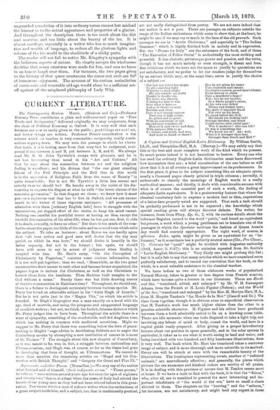C UR RENT LITERATURE
The Contemporary Review. March. (Strahan and Co.)—Professor Bonatny Price contributes a plain and well-reasoned paper on "Free Trade and Reciprocity," delivered originally, we may conjecture, from the chair of Political Economy at Oxford. It is very well that such lectures are now so easily given to the public ; good things are n)t I oat, and better things are written. Professor Price's contribution o the science which he teaches is very seasonable ; reciprocity really needs serious arguing down. NVo may note the passage in which he shows that trade, if it is lasting, must from that very fact be reciprocal, reci- procal if not between A and B, yet between A, B, and C. We always read Mr. R. St John Tyrwhitt's essays with pleasure, and he is not less int( resting than usual in his " Art and Culture." All that he says about the connection between art and the religious feeling is excellent ; and his dictum that "the one great standing labour of the Evil Principle and the Evil One in this world is in the separation of Religious Faith from the sense of Beauty" is quite remarkable. But is not Mr. Tyrwhitt a little less serene and orderly than he should be ? He breaks away in the midst of his dis- coursing to express his disgust at what he calls "the lower classes of the muscular persuasion." In that disgust we share ; we know how it must possess a righteous soul that has to live in Oxford, and we can excuse much to tat) writer of these vigorous sentences. "All processes of education with them [ordinary English lads] have to struggle with the unconscious, yet dogged effort of the victim to keep his mind vacant. Nothing can parallel his youthful terror at having an idea, except the twofold determination of his after-life, when he has got one, first, to ride it to death, secondly, to have no other." But there is too much of the com- bative about the paper, too little of the calm and measured tone which suits the subject. To take an instance : about Byron we can hardly agree that "all true artists and good men will desire that the day may perish on which be was born," we should desire it heartily in the latter capacity, but not in the former ; but, again, we should have still more to say in arrest of judgment when Shelley is
coupled wills him. Mr. Batt's essay, "On the Corruption of Christianity by Paganism," contains some curious information, but it is not well put together ; thus we read, "Meanwhile, as the two great communities drew nearer to each other and became better acquainted, the pagans began to imitate the Christians, as well as the Christians to borrow ideas from the heathens. Thus Hadrian built temples to the God without a name." Surely there was but little drawing nearer of the two communities in Hadrian's time? Throughout, we should say, there is a failure to distinguish accurately between various epochs. Mr. Perry has found an admirable subject in his "Saint Hugh of Lincoln." But he is not quite just to the "Magna Vita," on which his article is founded. St. Hugh's biographer was a man exactly on a level with his age, fond of marvels, and using the pompous and exaggerated language of monkish writers ; but not, we think, the foolish, fulsome flatterer which Mr. Perry judges him to have been. Throughout the article there is a want of sympathy, something of the comfortable, well-fed Anglican tone, which has nothing in common with media3val asceticism. Might we suggest to Mr. Perry that there was something below tbe love of peace- making in Hugh's "sage advice to Archbishop,Baldwin not to anger the Canterbury monks by attempting a new institution of canons in honour of St. Thomas " ? The struggle about this new chapter of Canterbury, as it was meant to be, was, in fact, a straggle between nationalism and Ultramontanism, and Hugh was, of course, as far as the times had gone in developing that form of thought, an Ultramontane. We cannot do more than mention the remaining articles on "Hegel and his Con- nection with British Thought," and "Gregory the Great and Pius IX."








































 Previous page
Previous page